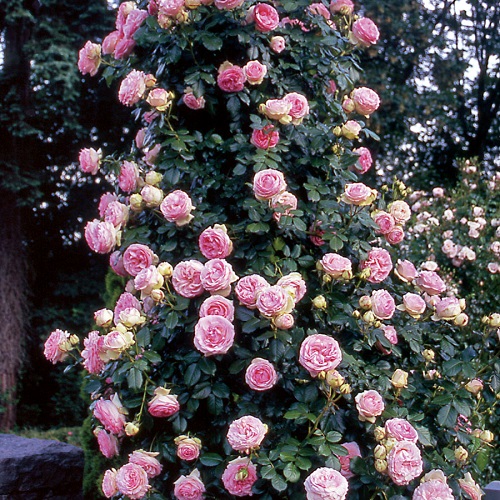FWP:
Well, if there's something special going on in this verse, it eludes me. We're left with the 'rational' choice of a rose-vine twining so lavishly around a cypress that it becomes a robe, or the 'exaggerated' choice, denounced in advance (somewhat ambivalently) by Nazm, of a single gigantic rose becoming overwhelming enough to be a robe for a cypress. And I suppose the proverbial tallness of the cypress, and the idea of a 'shortfall' in growth, bounce off each other to a degree. There's also a small sound-play in the sequence of pah pai , which are almost homonyms.
So maybe it's just a 'spring is here!' kind of verse, and
its charm is meant to lie in its exclamatory, inshaa))iyah
structure and perhaps its mood.
But it's still pretty forgettable.

Nazm:
What a remarkable exaggeration, such that within the scope of the exaggeration he's shown an attractive vision too! But by the rose becoming a robe for the stature of the cypress is meant not that one rose would grow so tall that it would become the cypress's robe, but rather the author's intention is that the branches of the rose should so flourish that they would become wrapped around the cypress and cause it to wear a robe of flowers. And in this exaggeration there's the excellence that nothing impossible is necessary.
And if by 'rose' one rose would be intended, then the exaggeration moves toward impossibility, and this is a fault in exaggeration, and this fault has always been described by writers as a fault, but the poets of Persia and Hind perhaps consider it a verbal device, and don't avoid it. Everybody has been heard committing this fault. The late author himself takes no care against speaking of impossibilities [mu;haal-go))ii]; for example, we've seen this verse: {120,5}. That is, she's so blood-shedding that her horse swims in a river of blood. It's only impossible exaggeration. [Further discussion, with examples from Vazir, Nasikh, and Momin.] (219-21)
== Nazm page 219; Nazm page 220; Nazm page 221